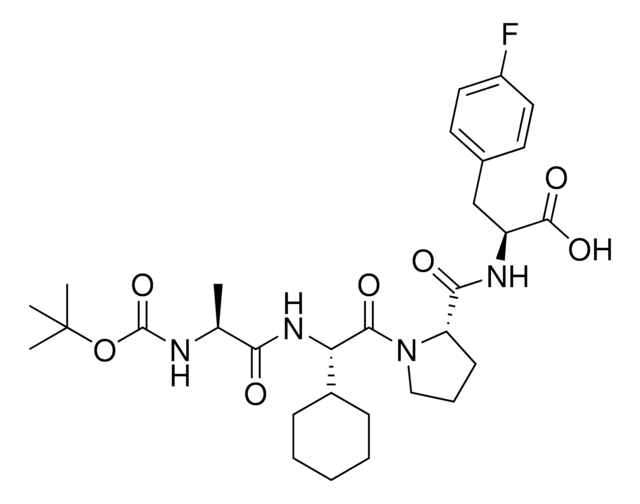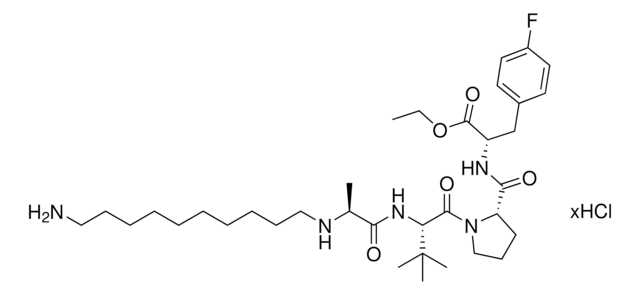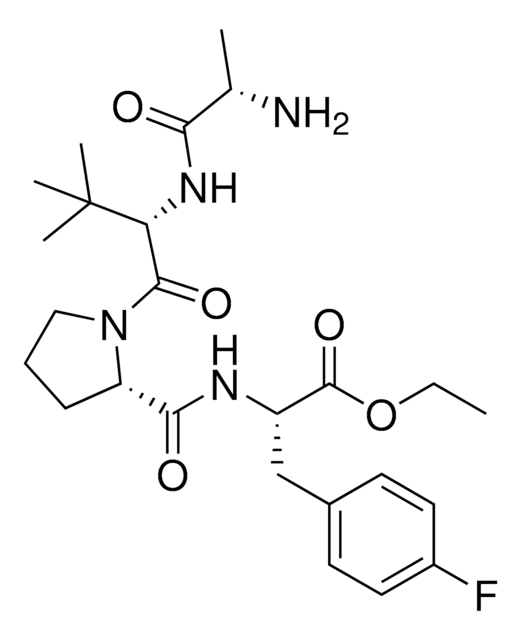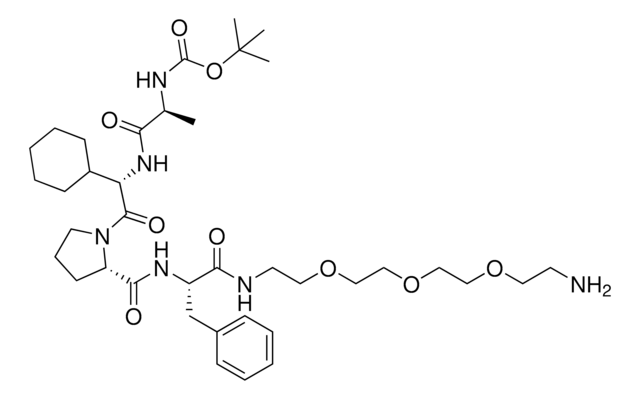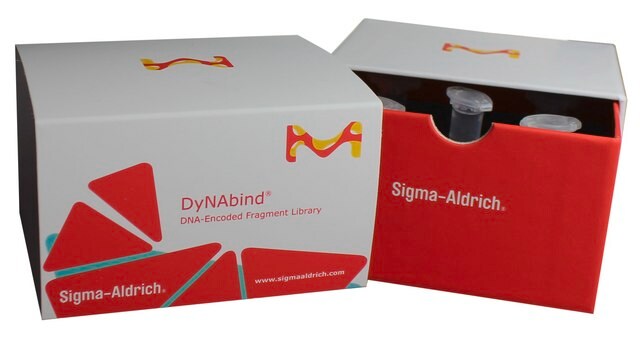Recommended Products
form
solid (powder or film on well wall)
Quality Level
reaction suitability
reagent type: ligand
concentration
125 μg/well
suitability
suitable for H-NMR
suitable for LC-MS
storage temp.
2-8°C
Application
The ComInnex IAP Ligand Library is an 80-member collection of in-silico-derived ligands targeting cellular inhibitor of apoptosis protein 1 (cIAP1). cIAP1 is an E3 ligase of interest for the development of protein degraders, specifically called specific and non-genetic IAP-dependent protein erasers (SNIPERs).
Based on the SAR rules outlined in IAP antagonist research, the binding tetrapeptide anchor of the natural SMAC inhibitor protein of IAPs (AVPI and AVPF) was used in identification of novel derivatives designed by 3D similarity.
The initial library was filtered via in silico IFD methods by docking to the BIR3 domain of the IAP crystal structures. The highest binding derivatives were selected and collected in a screening library, including the natural binding tetrapeptides and known MV1 reference compounds. IAP in silico leads are an optimal collection to begin IAP lead discovery at the bench for eventual development into bifunctional protein degraders. With the proper assay setup to measure protein degradation or protein-protein interactions (PPIs), the ComInnex IAP Ligand Library can also be a platform for molecular glue discovery.
Learn more about this library: Accelerating IAP Lead Discovery for Targeted Protein Degradation
To view a complete list of compounds in the library, including sdf, visit the CIX001 Plate Map.
To streamline the assessment of these in silico leads for target-specific bifunctional degraders, three IAP ligands with the highest docking scores were also prepared as degrader building blocks for simple attachment of a target warhead.
Based on the SAR rules outlined in IAP antagonist research, the binding tetrapeptide anchor of the natural SMAC inhibitor protein of IAPs (AVPI and AVPF) was used in identification of novel derivatives designed by 3D similarity.
The initial library was filtered via in silico IFD methods by docking to the BIR3 domain of the IAP crystal structures. The highest binding derivatives were selected and collected in a screening library, including the natural binding tetrapeptides and known MV1 reference compounds. IAP in silico leads are an optimal collection to begin IAP lead discovery at the bench for eventual development into bifunctional protein degraders. With the proper assay setup to measure protein degradation or protein-protein interactions (PPIs), the ComInnex IAP Ligand Library can also be a platform for molecular glue discovery.
Learn more about this library: Accelerating IAP Lead Discovery for Targeted Protein Degradation
To view a complete list of compounds in the library, including sdf, visit the CIX001 Plate Map.
To streamline the assessment of these in silico leads for target-specific bifunctional degraders, three IAP ligands with the highest docking scores were also prepared as degrader building blocks for simple attachment of a target warhead.
Biochem/physiol Actions
80 compounds are arranged in 96-microtube format with two open rows for screening controls if using liquid handling setups. One compound per tube (125 μg in solid form). Compound concentration in assays will vary depending on assay type, but common screening library stock solutions are 2 mM or 10 mM in DMSO.
related product
Product No.
Description
Pricing
Storage Class Code
11 - Combustible Solids
WGK
WGK 3
Choose from one of the most recent versions:
Certificates of Analysis (COA)
Lot/Batch Number
Sorry, we don't have COAs for this product available online at this time.
If you need assistance, please contact Customer Support.
Already Own This Product?
Find documentation for the products that you have recently purchased in the Document Library.
Norihito Shibata et al.
Cancer science, 108(8), 1657-1666 (2017-05-31)
Chromosomal translocation occurs in some cancer cells, which results in the expression of aberrant oncogenic fusion proteins that include BCR-ABL in chronic myelogenous leukemia (CML). Inhibitors of ABL tyrosine kinase, such as imatinib and dasatinib, exhibit remarkable therapeutic effects, although
Our team of scientists has experience in all areas of research including Life Science, Material Science, Chemical Synthesis, Chromatography, Analytical and many others.
Contact Technical Service